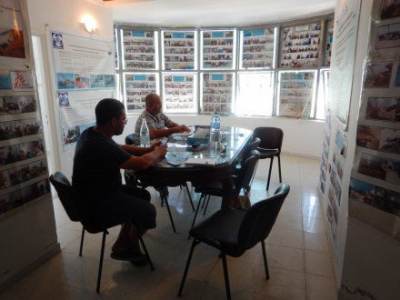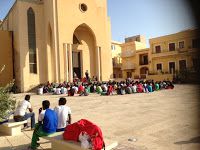From one confinement to another. The illegitimate detention of the Sea-Watch migrants in the Hotspot of Messina.
Press release – Those who disembarked the 29th of June in Lampedusa, after waiting 17 days at sea on board the Sea-Watch 3, now find themselves in illegal detention at the Hotspot in Messina.
This incident reveals the urgency to question what happens after arrival. After disembarking a period of substantial invisibility begins, where fundamental rights of foreign citizens are being violated, from the right to personal liberty to the right of asylum, both of constitutional significance.
The foreign citizens, finally arriving in Lampedusa, were brought to the local hotspot in Contrada Imbriacola where they were identified and subjected to a particular and ambiguous form of detention until July 4th. The gates of the Hotspot in Lampedusa are permanently closed and controlled. There is no form of regulation concerning entry or exit for the foreign citizens. If they ask the police and military to open the gate, they are clearly told that exit is not possible. However, in some cases people leave through holes in the fence, a practice known by authorities who generally do not oppose it.
Obviously, those who do not want to violate the rules that seem part of the structure of the center, or those who for various reasons are not able to pass through the fence have to live plainly the conditions of confinement. After their stay in Lampedusa, people were transferred to the Hotspot in Messina, from where they were not allowed to leave, until today. From their arrival in Italy 11 days ago, those foreign citizens after 17 days waiting at sea for an allocation to disembark, find themselves in conditions of arbitrary detention.
Examining the juridical implications of this incident, it has to be noted that before the assignment of the status of applicant for international protection or the notification of a removal order from national territory for those who are not recognized as such, no form of limitation of personal freedom can be enforced in the Hotspots. The controversial law 132/2018 introduces for the first time the possibility to detain foreign citizens in the Hotspots on the assumption, of doubtful constitutional legitimacy, that the detention of asylum seekers is for verifying their identity or nationality, and the detention of foreign citizens in receipt of an expulsion order when there’s no free space in the repatriation centres. In these cases detention is only possible through the issue of a written order, validated by a judicial authority. In the case of the people saved by the Sea-Watch, just as in many other cases, the authorities limit themselves to deprive people of their freedom without any notifying measures and without these people ever being able to meet a judge who expresses him*herself on the legitimacy of detention.
It is useful to remember once more that any kind of deprivation of personal freedom that is not explicitly foreseen by law, issued through a written order of the judicial or another authority and validated by the judicial authority within 48 hours after the measure has been adopted, constitutes a violation of the principle of inviolability of personal freedom contained in article 13 of the constitution.
However, despite the flagrant illegality this type of detention is, in practice, accepted by all the actors – public and private – framed within the process of governing migration. The police, operators of protecting bodies and European officials contribute to the reproduction of these detention practices. The perpetuation of these behaviours has produced a fiction, according to which the hotspot is considered collectively and in short as a place of detention.
This type of detention, serious, illegitimate and to be contested and sanctioned in the case of the persons rescued by the Sea-Watch 3 becomes a grotesque character. The arbitrary detention imposed in these circumstances for 11 days on people who have had their freedom limited for 17 days on the deck of a ship in extreme, materially precarious conditions.
What we have in front of us is a special incident. It concerns single foreign citizens, each one with their own biography, hopes and needs. At the same time, this incident inscribes itself, in a more general way, into the politics of the hotspots. The illegitimate violation of personal freedom to which these people are subjected is, in fact, a continuity of what has been observed in the last three years in different contexts and times.
Seen in the light of the legal system in its complexity, this incident takes on a frightening proportion. It is, with all its effects, a microscopic form of arbitrariness. State authorities detain a specific social group outside the existing legislation. This is a violation so important that it has to be questioned profoundly – and call for judicial and civic mobilization – by civil society and its organizations.
We can try to imagine which feelings currently may accompany the detention of the migrants. It is possible that staying in the hotspot of Messina is characterized by insecurity, fear and bewilderment. From another perspective, those who, like us, oversee the detention from the outside, are marked by a profound concern. This arbitrariness seems to be a punctual indicator of the overall authoritarian twist that runs through our country: the law applied to foreign citizens is like a litmus test in this circumstance.
In regard to these macroscopic violations, the signing organizations consider intolerable that anyone’s personal freedom can be violated through detention factually outside situations and modes strictly foreseen by law and under judicial control as prescribed by article 13 of the constitution and by international norms in a country in which the rule of law should apply:
- We urge the competent authorities to set out the immediate liberation of the foreign citizens detained illegally in the hotspot of Messina;
- We urge the competent authorities to set out the immediate liberation of the foreign citizens detained illegally in the hotspot of Messina;
- We call on the authorities to provide clear and public information on the judicial conditions and the procedures to which these foreign citizens detained in Messina are subjected to currently;
- We call on the national Ombudsman for persons detained or deprived of personal liberty to arrange immediate inspections in the centres of Lampedusa and Messina in order to ascertain the actual circumstances in which the illegally detained persons are located and to immediately inform the Minister of the Interior, Parliament and public opinion.
Association for Juridical Studies on Immigration (ASGI)
ActionAid
Borderline Sicilia
IndieWatch
Medici per i Diritti Umani – MEDU
Sea-Watch
For adhesion and information:
inlimine@asgi.it; +39 3894988460
Translated by Helena Hattmannsdorfer



